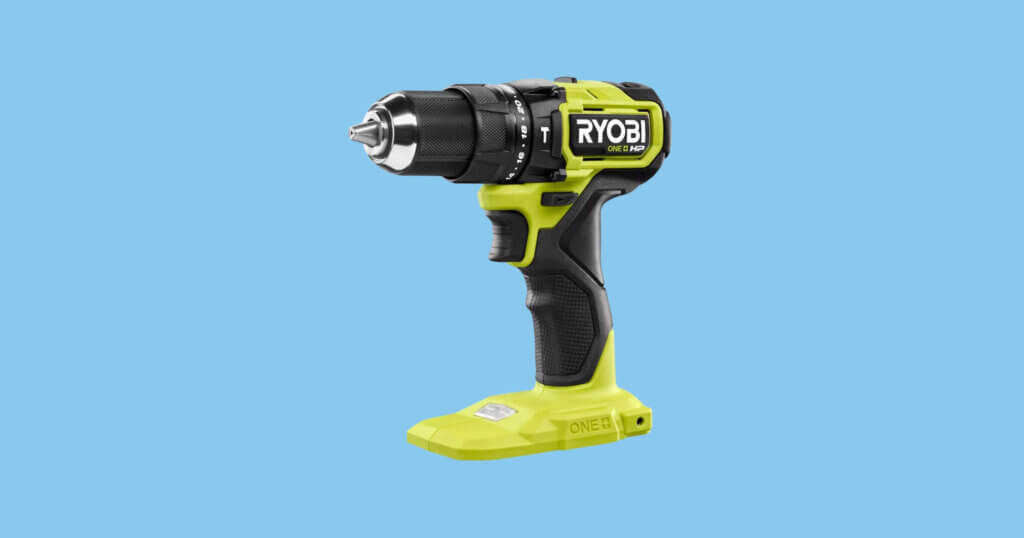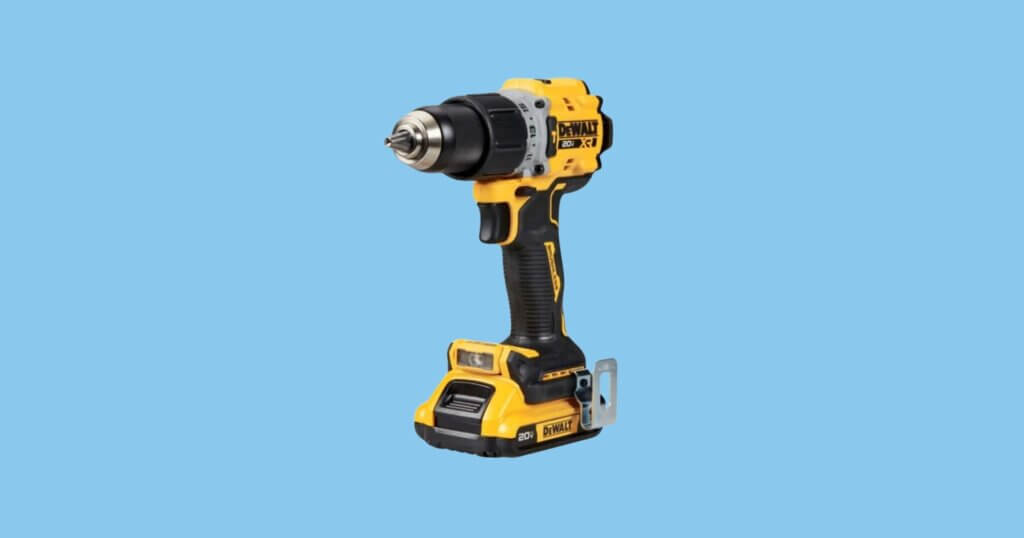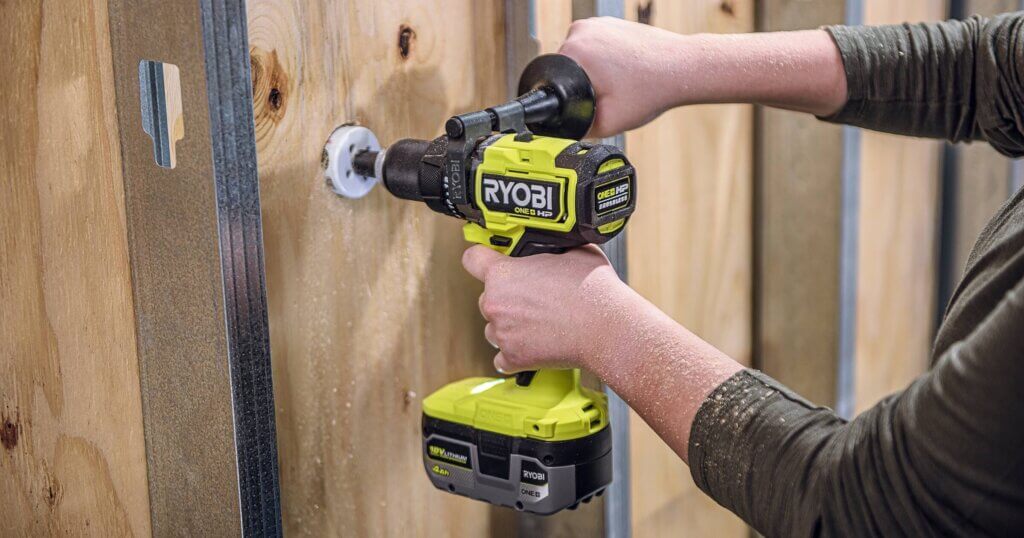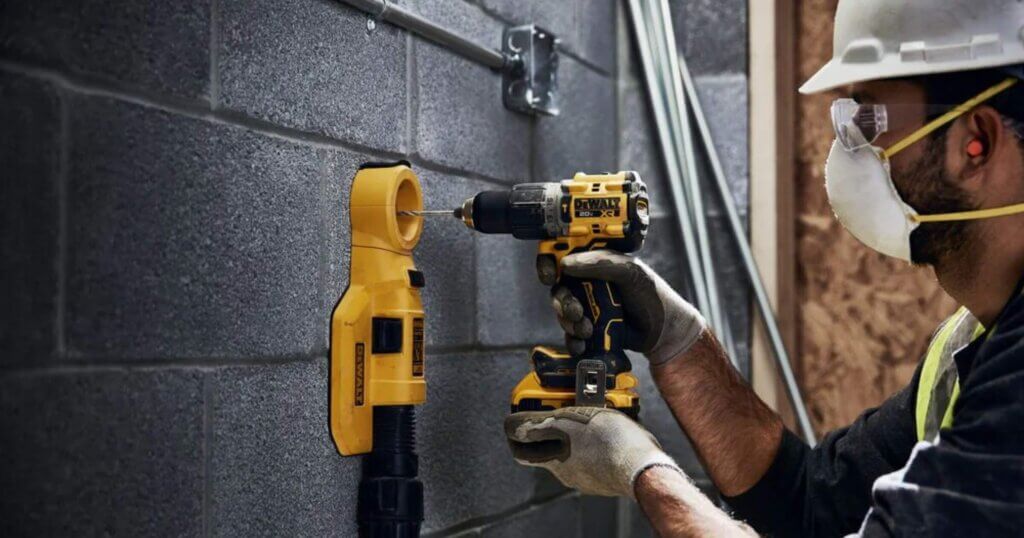When it comes to choosing a hammer drill for construction or renovation work, two models stand out: the Ryobi 18V ONE+ HP Brushless 1/2″ Hammer Drill and the DeWalt 20V MAX XR Brushless 1/2″ Hammer Drill. Both offer brushless motors, compact designs, and high-performance specs. But which one delivers more value for your money? In this article we put Ryobi vs DeWalt hammer drills head to head in a comparison breakding down the specs, performance, ergonomics, and real-world feedback to help you decide which hammer drill is better.
Ryobi 18V ONE vs DeWalt 20V MAX XR hammer drills overview
Ryobi 18V ONE+ HP brushless 1/2″ hammer drill

Ryobi’s 18V ONE hammer dril is part of the brand’s high-performance ONE+ HP lineup. It’s designed for heavy-duty tasks and features a brushless motor that delivers up to 850 in-lbs of torque and 34,000 BPM. This model is compatible with over 300 tools in the Ryobi ONE+ system, making it a versatile choice for those already invested in Ryobi’s ecosystem.
DeWalt 20V MAX XR brushless 1/2″ hammer drill

DeWalt’s DCD806B is a professional-grade hammer drill in the 20V MAX XR series. It offers 1,050 unit watts out (UWO) of power, 34,000 BPM, and a compact 7″ length. The DCD806B is known for its durability and is backed by DeWalt’s 3-year limited warranty, 1-year free service, and 90-day satisfaction guarantee.
Specifications comparison: Ryobi hammer drill vs DeWalt hammer drill
| Specs | Ryobi PBLHM102B | DeWalt DCD806B |
| Voltage | 18V | 20V MAX |
| Max Torque | 850 in-lbs | 1,050 UWO |
| BPM | 0–34,000 | 0–34,000 |
| RPM | 0–700 / 0–2,150 | 0–650 / 0–2,000 |
| Clutch Positions | 24 | 14 |
| Chuck Type | 1/2″ Ratcheting Metal | 1/2″ Ratcheting Metal |
| Length | 7.5” | 7” |
| Weight (tool only) | 3.1lbs | 2.95lbs |
| Battery System | ONE+ 18V (over 300 compatible tools) | 20V MAX XR |
| Warranty | 3 years | 3 years limited, 1 year free service |
Performance and power: Which hammer drill packs more punch?
Both the Ryobi PBLHM102B and the DeWalt DCD806B are capable hammer drills that deliver serious power, but the way they deliver that power and how it translates to real-world tasks differs slightly.
Ryobi 18V ONE: Solid power for serious DIY and light trade work
Ryobi’s 18V ONE produces up to 850 in-lbs of torque and 0–34,000 blows per minute (BPM) in hammer mode, giving it the muscle to tackle masonry, brick, and concrete drilling with ease. Its 2-speed gearbox offers 0–700 RPM in low gear (great for high-torque driving tasks) and up to 2,150 RPM in high gear for faster drilling in wood, metal, and masonry.
In independent user tests, Ryobi’s hammer drill performed admirably when drilling 1/4″ holes into concrete blocks, completing the task only marginally slower than premium brands. Its ratcheting metal chuck maintains a solid grip on bits, preventing slippage even during heavy-duty work.

For general drilling and driving, the Ryobi holds its own. It’s particularly well-suited for:
- DIYers building decks or pergolas who need high torque for driving long lag screws.
- Home renovators tackling basement renovations, where drilling into concrete is frequent.
- Users who already own Ryobi’s ONE+ batteries, giving them a convenient and affordable performance boost.
However, some professionals note that while the Ryobi is plenty capable, it can stall slightly sooner under extreme load compared to higher-end tools like DeWalt. For most users, this won’t be an issue, but if you’re routinely drilling 1/2″ holes into cured concrete, it’s something to consider.
DeWalt 20V Max: More power, compact design, pro-grade performance
DeWalt’s DCD806B steps up the game with a 1,050 Unit Watts Out (UWO) motor, which translates to excellent torque and power efficiency. Though DeWalt lists UWO instead of in-lbs torque, real-world usage shows that this model delivers more muscle under load than the Ryobi. In fact, in comparative tests, the DCD806B was able to drill a 1/2″ hole into pressure-treated lumber 2–3 seconds faster than mid-tier competitors, including Ryobi’s brushless models.
It matches Ryobi’s 0–34,000 BPM but with slightly different speed ranges: 0–650 RPM in low gear and up to 2,000 RPM in high gear. While its high gear maxes out slightly lower than Ryobi’s, DeWalt’s motor compensates with higher sustained torque, which is especially useful when drilling into dense materials like block walls or hardwood beams.
The DeWallt hammer drill compact 7″ length also gives it a big edge in tight spaces like drilling between studs, joists, or in cabinet installations. Tradespeople often cite this drill’s “punch above its weight” performance, noting it can handle tasks typically reserved for larger, heavier drills.

For jobsite tasks, the DeWalt excels at:
- Concrete anchor installations, where stalling is not an option.
- Cabinetry and electrical rough-ins, thanks to its compact design.
- Heavy-duty fastening, such as driving long lag bolts into dense wood.
Ryobi vs DeWalt: Battery life & runtime
Both drills use lithium-ion batteries, but real-world runtime varies depending on the task:
- Ryobi’s 18V ONE+ HP system is designed for efficiency but will require a larger (4Ah or more) battery to keep up with heavy-duty hammer drilling. With smaller batteries, users report needing to swap packs more frequently on masonry jobs.
- DeWalt’s 20V MAX XR batteries tend to offer longer sustained power output. Paired with a 5Ah XR battery, users report being able to drill over 40 1/4″ holes in concrete blocks before needing a recharge.
While Ryobi is perfectly adequate for medium-duty use, DeWalt’s combination of power efficiency and XR battery technology gives it the upper hand for all-day tasks.
Ease of use & ergonomics: Which is more beginner-friendly?
Handling and balance
- Ryobi hammer drill: This drill is designed with a balanced weight distribution, making it comfortable to handle during extended use. Users have noted its ease of maneuverability, attributing this to its well-thought-out design.
- DeWalt hammer drill: This drill measures just 7 inches in length, which enhances its balance and makes it suitable for tight spaces. Its shorter length compared to previous models contributes to a more balanced feel in the hand.
Grip and controls
- Ryobi 18V ONE: Equipped with a generous rubber overmold, the Ryobi drill offers a comfortable grip, reducing hand fatigue during prolonged use. The controls are intuitive, allowing for easy operation even for beginners.
- DeWalt DCD806B: The DeWalt drill features an ergonomic grip design that fits naturally in the hand, enhancing control and comfort. Its user-friendly controls are praised for their responsiveness and ease of use.
Vibration and noise
- Ryobi 18V ONE: Users have reported that the Ryobi drill operates smoothly, with minimal vibration, which contributes to a more comfortable user experience.
- DeWalt DCD806B: The DeWalt drill is noted for its smooth operation, with users highlighting its low vibration levels, which is beneficial during extended periods of use.
One-handed or overhead use
- Ryobi 18V ONE: While the Ryobi drill is slightly heavier, its balanced design allows for one-handed operation in many scenarios. However, prolonged overhead use might lead to fatigue earlier than DeWalt.
- DeWalt DCD806B: The compact and lightweight design of the DeWalt drill makes it ideal for one-handed and overhead use.
Verdict on ergonomics
While both hammer drills are comfortable and user-friendly, the DeWalt DCD806B takes the edge in ergonomics. Its compact 7-inch body and lighter weight make it noticeably easier to handle for overhead work, one-handed use, and working in tight spaces. These advantages are especially helpful for beginners or anyone tackling projects that require extended drilling without fatigue.
The Ryobi’s 18V ONE hammer drill still offers an excellent grip and solid balance for general use, but for pure ease of handling, DeWalt’s more refined ergonomic design comes out on top.
DeWalt vs Ryobi: Which one gives more bang for your buck?
Pricing can vary based on promotions and included accessories.
- Ryobi 18V ONE: Often priced competitively, especially when considering its inclusion in the ONE+ system the Ryobi hammer drill costs around $70 on its own and up to $160 with accessories. It’s a clear winner when it comes to price.
- DeWalt DCD806B: Typically positioned at a higher price point, the DeWalt Hammer drill ranges between $190 to $230 depending on which package you choose. While the initial investment is higher, many users find that the durability and reliability justify the cost.
Features & accessories: What extra features do they offer?
Ryobi 18V ONE – Standout features
- 24-Position Clutch + hammer mode: Versatile control for different drilling and driving jobs.
- Auxiliary handle: Improves stability and reduces fatigue during more demanding tasks.
- ONE+ System compatibility: Works with over 300 Ryobi tools and batteries.
- On-Board LED Light: Simple, effective illumination for low-light work.
DeWalt DCD806B – Standout features
- Anti-Rotation E-Clutch: Senses sudden rotation and stops the drill to prevent injuries.
- 3-Mode LED Light: Includes a 20-minute spotlight mode for working in dark spaces.
- TOOL CONNECT™ ready: Compatible with DeWalt’s tool tracking system (chip sold separately).
- Belt Hook: Convenient for on-the-go use on job sites.
Pros and cons summary
Ryobi hammer drill
Pros:
- High torque (850 in-lbs)
- 24-position clutch for precise control
- LED worklight
- Auxiliary handle included
- Affordable price point
Cons:
- Slightly bulkier design
- Not as compact as some competitors
- Limited to Ryobi’s battery system
DeWalt hammer drill
Pros:
- High power output (1,050 UWO)
- Compact 7″ length
- LED spotlight mode
- Ergonomic design for reduced fatigue
- Part of the extensive 20V MAX XR lineup
Cons:
- Higher price point
- Fewer clutch settings (14 positions)
- Battery and charger sold separately
DeWalt vs Ryobi: Which hammer drill should you buy?
Both the Ryobi PBLHM102B and the DeWalt DCD806B are excellent hammer drills, but they’re aimed at slightly different users. Choosing the right one depends on what you need from your tool.
If you’re a DIYer, homeowner, or weekend warrior, the Ryobi PBLHM102B offers incredible value. With 850 in-lbs of torque, 34,000 BPM, and a user-friendly design, it’s more than capable of handling concrete, brick, and general drilling tasks around the house. Its compatibility with the Ryobi ONE+ system makes it a smart buy for those who already own Ryobi batteries and tools. Plus, its affordability means you get solid performance without breaking the bank.
On the other hand, if you’re a serious DIYer, contractor, or tradesperson, the DeWalt DCD806B is the better investment. With higher power output (1,050 UWO), superior chuck grip, compact size, and 3-mode LED lighting, it’s designed to meet daily jobsite demands. Its slightly heavier price tag is justified by its refined ergonomics and performance in more demanding conditions.
Here’s the bottom line:
- Get the Ryobi PBLHM102B if you want an affordable, capable hammer drill for home projects, light masonry, and general-purpose use.
- Choose the DeWalt DCD806B if you need professional-grade power, durability, and precision for tougher materials and frequent heavy-duty tasks.
For more reviews on Ryobi tools or DeWalt, subscribre to our newsletter at https://underthehardhat.org/join-us/.

